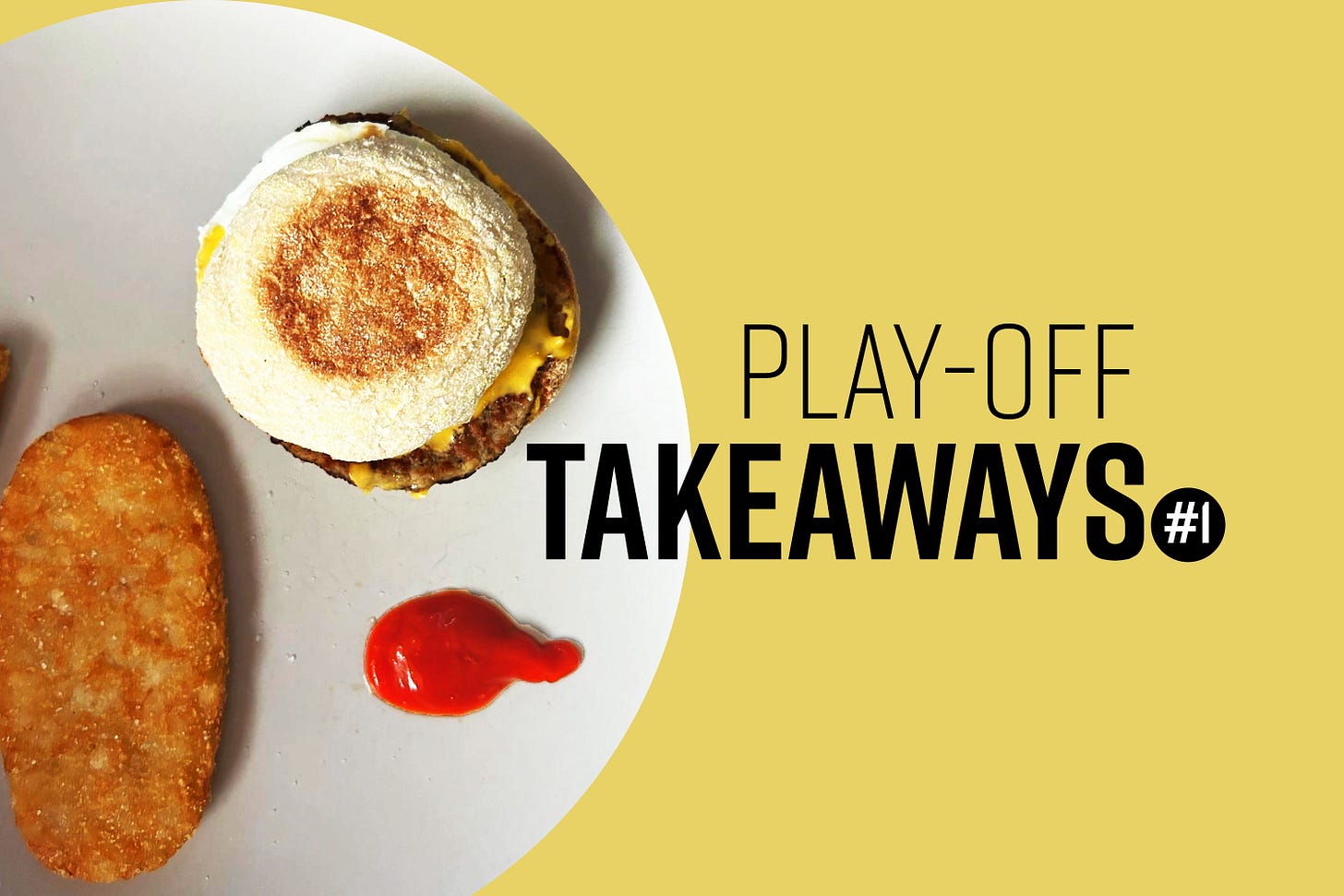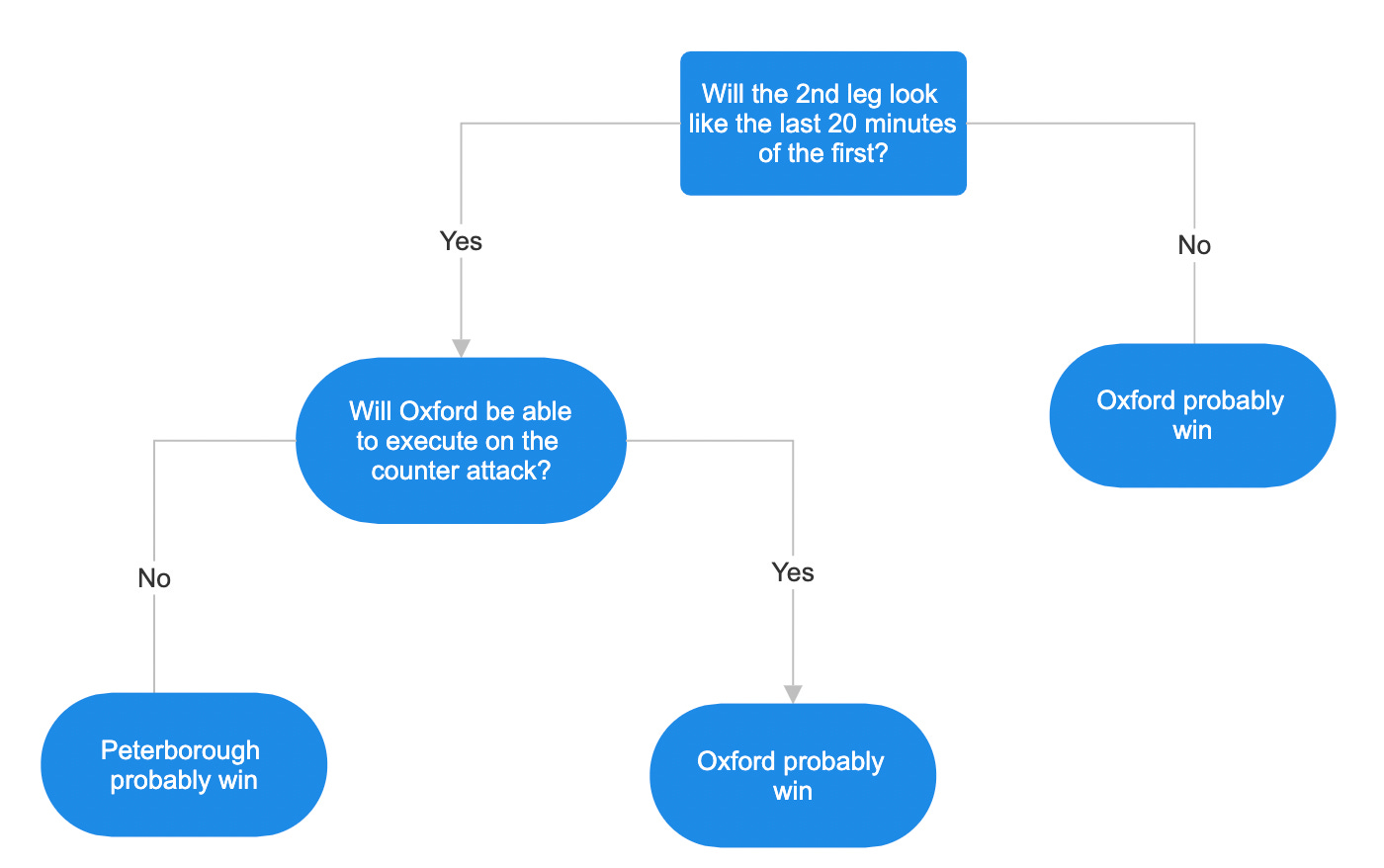Play-Off Takeaways
Plan B for Bolton, Mellow Yellows force Posh to push, and Crewe running on empty in El Traffico.
Huw Davies
Poppadoms. Spring rolls. Hummus, if you’re so inclined. A good starter can make for a great takeaway, and the first legs of the play-off semi-finals in League One and League Two provided some very good starters indeed – tasty in their own right while whetting the appetite for more.
Unfortunately we were short-changed as Crawley v MK Dons didn’t turn up (call the driver, he can’t have gone far), but the three non-waterlogged matches gave us plenty to think about. Which manager changed his season-long setup to great effect? Which team needs to work on their counter culture ahead of the second leg? And who filled the petrol engine with diesel?
We've answered those questions and more, including a free appetiser as NTT20.com officially welcomes Bromley to our EFL order. Plate up and tuck into our takeaways, and don’t even think about leaving any leftovers for tomorrow.
1. Plan B for Bolton
Ali Maxwell
This was Bolton’s 34th win in all competitions this season. It was their biggest win of the season. And, tactically, it looked completely different to the other 33.
Barnsley came into the game having picked up the joint-fewest points in League One over the final eight games of the campaign, and with an inexperienced, interim manager in the dugout. Bolton arrived in South Yorkshire boasting an 11-point, +17 goal regular-season superiority over their opponents, plus a settled, established management team and playing style. The obvious tactical strategy for Ian Evatt was surely, “Play our own game and we’ll impose ourselves on — and beat — our shaky opposition.”
Instead, Evatt bowled a googly. A manager who has become known for his stubborn belief in Plan A suddenly rolled out Plan B.
After the game, goalkeeper Nathan Baxter said, “We played a slightly different style in build-up than we usually do.” You can say that again, Nathan! And we can measure it using your own passing stats. Analysing goalkeeper distribution stats is a clear way to identify a team’s build-up strategy, and Bolton normally like to build their attacks from the back — in the regular season, only 13.7% of Baxter’s passes went long. On Friday, it was 69%. Nice.
Against one of the most direct teams in the league, who have no interest in knocking the ball around, Bolton logged their lowest possession percentage of the season. On Friday, they completed just 170 passes – their fewest in a match the season, and less than half of their average of 375 passes completed per game.
“We knew they would press aggressively and we knew we had to play over the press, which isn’t always like us, but to get a result here, we felt that was the right way to go.” — Ian Evatt
Barnsley have caused themselves problems with terrible defending recently:
Gaps between defenders
Very little protection from midfield
Poor tracking of runs
Individual mistakes from defenders or goalkeeper
So why not attack Barnsley quickly and directly and make them uncomfortable? You could argue that the first and second goals proved the success of this approach.
But this was a defensive tactic as well. This was about managing the occasion, taking the sting out of a crucial game and reducing pressure. From the beginning, Bolton took their time over throw-ins, free kicks, goal kicks – Baxter was warned by the referee after ten minutes. This wasn’t ‘time wasting’ out of fear, nor an inferiority complex; it was game management.
Barnsley play a high-octane style. When the ball is in play, the sport is more akin to pinball. For Bolton, this was the first portion of 180 minutes of football, which started away from home. They didn’t need to rush. They did need to try and keep defensive lapses to a minimum and avoid any silly errors playing out from the back.
Slowing the game down, and playing long? It wasn’t very ‘Bolton Under Ian Evatt’, but you can’t argue with the result.
In the second leg, we can expect a reversion to Plan A, using the confidence gained from being at home to impose more control and exhaust Barnsley, probing with longer spells of possession before striking at the right time.
Interestingly, Bolton’s 2nd- and 3rd-lowest-possession matches this season were both against Peterborough United in the league – a match-up that could be the League One Play-Off Final. And if Bolton do go up, it’s likely they’ll have to be comfortable playing a quicker and more direct game in the Championship. Ipswich are the case study here, and they adapted magnificently to the change of style that promotion necessitated.
Over to you, Ian Evatt.
2. Mellow Yellows force Posh to push
Ali Maxwell
Cat and mouse is an English-language idiom that means “a contrived action involving constant pursuit, near captures, and repeated escapes”. The “cat” is unable to secure a definitive victory over the “mouse”, who, despite not being able to defeat the cat, is able to avoid capture.
I mean, Oxford did secure a definitive victory on the night with a goal from a set-piece, but the tactical battle in general play was a demonstration of the footballing cliché, ‘cancelling each other out’.
Oxford’s sturdiness in their defensive third was impeccable, and most Peterborough attacks were stopped before things got hairy. But Oxford’s attempts to initiate counter-attacks — their strongest avenue of attack — generally failed. The most exciting moments in open play came on half a dozen occasions where Ephron Mason-Clark and Josh Murphy had the ball at their feet. Neither was able to make them count.
But Peterborough couldn’t conceal a defensive flaw. Over the last few months, they’ve conceded a goal every other game from set pieces, and they did so once again.
The feeling of the game changed significantly in the last 20 minutes. Peterborough controlled the play, probed and prodded. Oxford’s backline stood strong.
I’ve posed the key questions ahead of the second leg in this attractive flow-chart:
All to play for. Beautifully poised. Etc. Etc.
3. Crewe running on empty in El Traffico
Sam Parry
You simply cannot call a match between two play-off sides ‘El Crapico’. Time for a new moniker. How about ‘El Traffico’? The one-way kind (sorry, Crewe fans).
Crewe flew through the gears like a newly-passed Corsa driver. They were catalysed by Lewis Billington early doors, who went full John Terry when tackling Hakeeb Adelakun with an on-the-floor header, and the next ten minutes were all Alex. Crosses. Long throws. Header after header. Thimothee Lo-Tutala in the Rovers goal was forced to get the bodywork dirty… a little, anyway.
It felt as though Lee Bell had pinned plenty on the thrust and torque of that frenetic opening. Donny rode it out. And when momentum shifted, the traffic only travelled in one direction. After a bitty opening, Rovers simplified things: break up play, keep it, put it on Adelakun’s foot or stick it on Joe Ironside’s head. That plan delivered and delivered quickly.
They broke up play. They kept the ball. They put it on Adelakun’s foot. Then he set Matthew Craig running, Craig slipped it across goal, and Luke Molyneux, moving across his runner, guided home an unstoppable finish.
Doncaster ran on electric after that, camped in the cross-hatchings of Crewe’s box junction. They almost scored a sumptuous second when Adelakun’s pass across the white-lines of the box was met first by the foot of Harrison Biggins and second by the crossbar. Biggins bagged a simpler effort early in the second half after Ironside’s composed goal-making pass, following Mickey Demetriou’s error. And at 2-0, Donny were in cruise control.
Fatalistic as it sounds, it felt as if nothing would ever drop for Crewe. They lost headers, 50/50s and second balls. Their build-up was baggy and their passes loose. What little danger they posed came from the bulk and muster of Demetriou’s long throw – when they won a throw-in, which wasn’t often. Put simply, they were off the pace and on the back foot throughout. And that was no great surprise: the form lines of these two teams veered incongruously, one rubbernecking their own demise, the other speeding towards their North London destination.
Donny had too much. Too much running, too much fizz, too much fuel for Crewe. Luke Molyneux never stopped. Adelakun was bright without ever needing to hit full-beam. The centre-backs did the needful. And Ironside relished the battle, typifying the broad sweep of Donny’s superiority – Land Rovers, the lot of ‘em, bigger, stronger and just… better. There was even time for a few “waaay”s.
Crewe will need to consult the AA to find a way out of this jam.
4. Cheeky Bromley join the EFL
Sam Parry
Once the hangover has abated, the dust has settled and the artificial turf replaced with grass, Hayes Lane will become the newest stadium in the EFL. Ground-tickers, amend your spreadsheets! Bromley’s home ground will play host to League Two teams in competitive fixtures for the first time, following their penalty shoot-out victory over Solihull Moors.
Manager Andy Woodman has overseen a youthful revival, giving a platform to PL2 prospects and homegrown players alike, including Jude Arthur, who scored a crucial penalty in the shoot-out.
The kids are all right. But there are some golden thirty-somethings, too. Byron Webster — part of the Yeovil side that made it to the Championship before he moved to Millwall — stuck away the winning penalty, EFL armband hugging his bicep. He has played his part.
And nobody is more emblematic of Bromley’s ascent than Michael Cheek. The all-time record goal-scorer in the National League, 32-year-old Cheek finally gets an opportunity in the EFL, and – for reasons of puns and pleasure – we can’t wait to see him.
5. Wet wet wet
MK Dons donned their rainmates for the journey to Crawley, but they never had cause to get off the coach: the first leg of the play-off tie was postponed before you could say “Deliveroo Brunch” (who says that?!).
Anyhow, those ties have now moved. MK Dons will travel to Crawley on Tuesday 7th May and the second leg at Stadium MK will take place on Saturday 11th May. Our enthusiasm, at least, has not been dampened.



